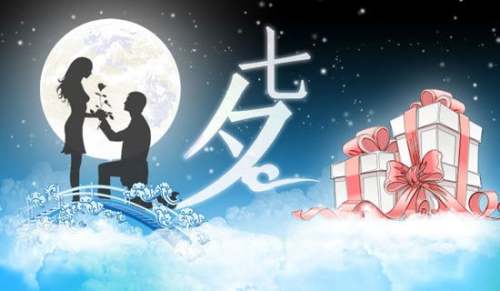七夕是几月几号
传说中牛郎织女相会的日子,是中国传统节日中最具浪漫色彩的日子,正被越来越多的年轻人看做是“中国情人节”。那么2016年七夕是几月几日星期几呢?

2016年七夕节是2016年8月9日,农历七月初七,星期二。
七夕节,又名乞巧节、七巧节或者七姐诞,发源于中国,是华人地区以及部分受汉族文化影响的东亚国家传统节日,农历七月七日夜或七月六日夜妇女在庭院向织女星祈求智巧,故称为“乞巧”。其起源于对自然的崇拜及妇女穿针乞巧,后被赋予了牛郎织女的传说使其成为象征爱情的节日。
“七夕”最早来源于人们对自然的崇拜。从历史文献上看,至少在三四千年前,随着人们对天文知识和纺织技术的产生,有关牵牛织女星的记载就有了。人们对星星的崇拜远不止是牵牛星和织女星,他们认为东西南北各有七颗代表方位的星星,合称二十八宿,其中以北斗七星最亮,可供夜间辨别方向。北斗七星的第一颗星叫魁星,有称魁首。后来,有了科举是制度,中状元叫“大魁天下士”,读书人把七夕叫“魁星节”,保持了最早七夕来源于星宿崇拜的'痕迹。
相传牛郎父母早逝又常受到哥嫂的虐待,只有一头老牛相伴。有一天老牛给他出了计谋,要娶织女做妻子。到了那一天,美丽的仙女们果然到银河沐浴,并在水中嬉戏。这时藏在芦苇中的牛郎突然跑出来拿走了织女的衣裳。惊慌失措的仙女们急忙穿好衣裳飞走了,唯独剩下织女。在牛郎的恳求下,织女答应做他的妻子。婚后,牛郎织女男耕女织,相亲相爱,生活得十分幸福美满。织女还给牛郎生了一儿一女。
后来,老牛要死去的时候,叮嘱牛郎要把它的皮留下来,到急难时披上以求帮助。老牛死后,夫妻俩忍痛剥下牛皮,把牛埋在上坡上。
织女和牛郎成亲的事被天庭玉帝和王母娘娘知道后,他们勃然大怒,并命令天神下界抓回织女。天神趁牛郎不在的时候,抓走了织女。牛郎回家不见织女,急忙披上了牛皮,担了两个小孩追去。眼看就要追上,王母娘娘心中一急,拔下头上的金簪向银河一划,昔日清浅的银河一霎间变得浊浪滔天,牛郎再也过不去了。
从此牛郎织女只能泪眼盈盈,隔河相望,天长地久,玉皇大帝和王母娘娘也拗不过他们之间的真挚情感,准许他们每年七月七日相会一次,每逢七月初七,人间的喜鹊就要飞上天去,在银河为牛郎织女搭鹊桥相会。此外,七夕夜深人静只是,人们还能在葡萄架或其他的瓜果架下听到牛郎织女在天上的脉脉情话。
教你给老外用英文讲“七夕”的传说
Double Seventh Festival(七夕节)
The Double Seventh Festival, on the 7th day of the 7th lunarmonth, is a traditional festival full of romance. It often goes into August in the Gregorian calendar.
七夕节是传统的节日,在农历7月7号。
This festival is in mid-summer when the weather is warm and the grass and trees reveal their luxuriousgreens. At night when the sky is dotted with stars, and people can see the Milky Way spanning from the north to the south. On each bank of it is a bright star, which see each other from afar. They are the Cowherd and Weaver Maid, and about them there is a beautiful love story passed down from generation to generation.
七夕节的背后有个美丽的故事。
Long, long ago, there was an honest and kind-hearted fellow named Niu Lang (Cowhand). His parents died when he was a child. Later he was driven out of his home by his sister-in-law. So he lived by himself herding cattle and farming. One day, a fairy from heaven Zhi Nu (Weaver Maid) fell in love with him and came down secretly to earth and married him. The cowhandfarmed in the field and the Weaver Maid wove at home. They lived a happy life and gave birth to a boy and a girl. Unfortunately, the God of Heaven soon found out the fact and ordered the Queen Mother of the Western Heavens to bring the Weaver Maid back.
牛郎和织女相爱。
With the help of celestial cattle, the Cowhand flew to heaven with his son and daughter. At the time when he was about to catch up with his wife, the Queen Mother took off one of her gold hairpins and made a stroke. One billowyriver appeared in front of the Cowhand. The Cowhand and Weaver Maid were separated on the two banks forever and could only feel their tears. Their loyaltyto love touched magpies, so tens of thousands of magpies came to build a bridge for the Cowhand and Weaver Maid to meet each other. The Queen Mother was eventually moved and allowed them to meet each year on the 7th of the 7th lunar month. Hence their meeting date has been called "Qi Xi" (Double Seventh).
牛郎织女七夕相会。
Scholars have shown the Double Seventh Festival originated from the Han Dynasty (206 BC-AD220). Historical documents from the Eastern Jin Dynasty (AD371-420) mention the festival, while records from the Tang Dynasty (618-907) depict the grand evening banquetof Emperor Taizong and his concubines. By the Song (960-1279) and Yuan (1279-1368) dynasties, special articles for the "Qi Xi" were seen being sold on markets in the capital. The bustling markets demonstrated the significance of the festival.
七夕故事被流传。
Today some traditional customs are still observed in ruralareas of China, but have been weakened or diluted in urban cities. However, the legend of the Cowhand and Weaver Maidhas taken root in the hearts of the people. In recent years, in particular, urban youths have celebrated it as Valentine's Day in China. As a result, owners of flower shops, bars and stores are full of joy as they sell more commodities for love.
中国传统节日七夕
【七夕是几月几号】相关文章:
今年七夕是几月几号12-19
春节是几月几号08-04
大寒是几月几号12-27
谷雨是几月几号12-27
2018小寒是几月几号12-27
2018春节是几月几号?08-03
白露是在几月几号11-14
重阳节是几月几号08-05
国庆节是几月几号12-27
2018正月15是几月几号12-19